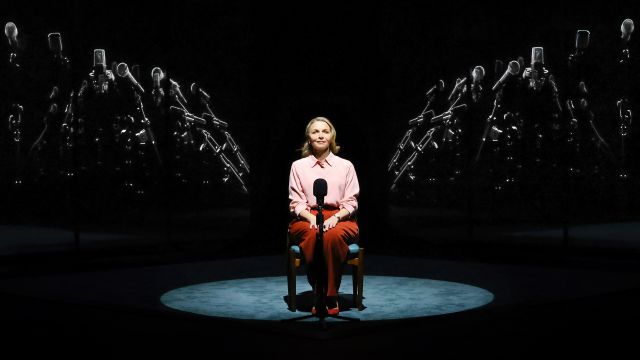Julia
Following Julia Gillard’s meteoric rise to Deputy Prime Minister, her challenge for Kevin Rudd’s position as leader of the Government surprised a nation that, though we had heard rumblings of discontent about Mr Rudd’s behaviour beyond the media spotlight, hadn’t yet caught up with the backstory. Her success in that challenge reflected the Labor Party’s maturation in recognising the ability of this woman with mannered self-restraint as well as intelligence to invite engagement, public and private, through her ability to consider alternative viewpoints carefully. And her success in the election she called to validate her position reflected the electorate’s relief that a real change from the antics of Tweedledum and Tweedledee had finally come about.
Gillard’s ability to step back to view current questions in their broader socio-political and historical context shines through in Joanna Murray-Smith’s Julia, which the playwright based on documents, interview records, and a good dose of creative but plausible imagination. Sydney Theatre Company’s production doubles Murray-Smith’s cast list, a second actress providing a light touch of visual context in representing a schoolfriend of Ms Gillard.
On a minimal but elegant stage put to brilliant use in adding to the emotional cues of a masterful soundtrack, Justine Clarke, as Gillard, bounced through the points of Gillard’s personal and then her political life that led her to take the role of P.M. and thereafter to endure with privately gritted teeth but outward serenity the escalation by Opposition leader Tony Abbott and his allies, including “shock jock” Alan Jones, in the offensiveness of their personal attacks on her. Recounting memorably detestable references to her clothing, her body shape, the sexuality of the man she shared her life with, and insulting mentions even more intimate, our on-stage Gillard led us, step by step, to the moment when she brought out the big guns and, in a passionate but well-focused argument, concentrated her contempt for an Opposition leader who would suddenly stake moral ground well above the cesspit in which he had previously homed himself with utter self-contentment.
That speech certainly forms the play’s climax; but its power in this setting derives much from the context both of our Gillard character’s upbringing and of the real Gillard’s unequalled achievements (nicely summed up for us in the lead-up) as an Australian prime minister. A play centring on a political speech could have been deadly; Murray-Smith’s Julia brought the intense personal and political passions of that moment in time right into the room with us, and the audience’s rapturous applause reflected a deep satisfaction in the play’s exquisite production and Justine Clarke’s captivating performance.
John P. Harvey
Image: Justine Clarke, in Julia. Photographer: Prudence Upton.
Subscribe to our E-Newsletter, buy our latest print edition or find a Performing Arts book at Book Nook.

